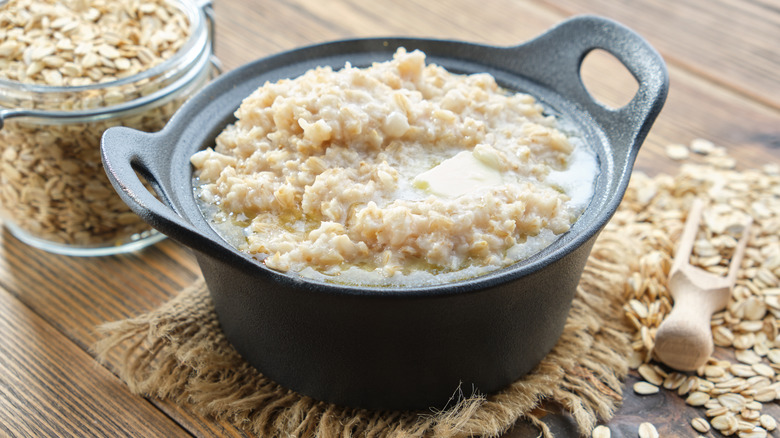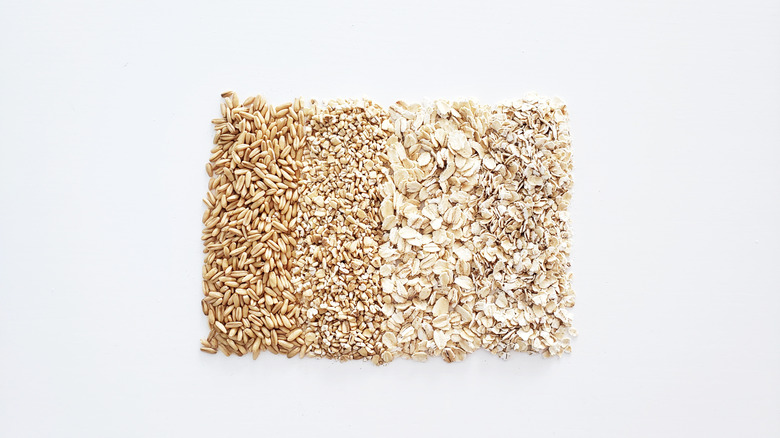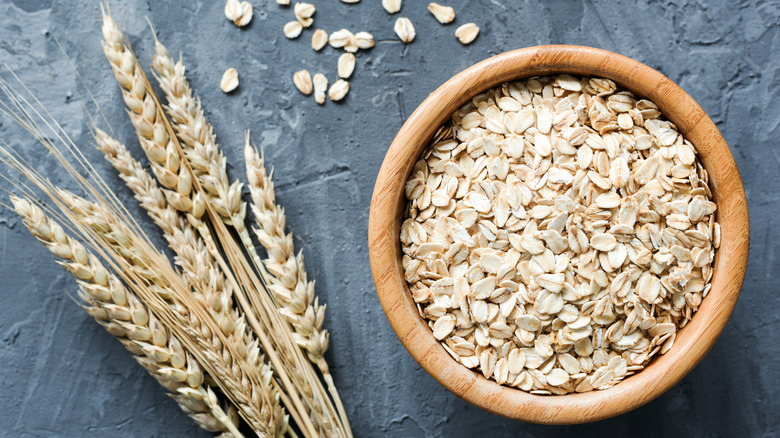Here's What Happens When You Eat Oats Every Day
For many years, oats, particularly in the form of oatmeal, were relegated to the blah, boring category — unless you happened to hail from Scotland and were in the habit of topping up your porridge with a wee dram o'whiskey. This was (or is) a tradition for some Scots, at least according to New Zealand publication Metro Eats!
In recent years, however, oats have been elevated to the ever-expanding pantheon of superfoods. Unlike certain other superfoods, such as once-tasty dark chocolate becoming even darker, when oats got trendy, this actually made them taste better. Overnight oats are not only convenient but relatively tasty, while uber-popular oat milk is a suitably shelf-stable item to add to your prepper pantry. Plus, if oats really are all that, then it makes oatmeal cookies practically a health food, right? Registered dietitian Kristen Carli of Phoenix's Camelback Nutrition & Wellness isn't exactly giving the go-ahead to gobble down cookies for breakfast, but she did tell Mashed that "adding more oats into your diet can help support a healthy heart, balance your blood sugar, and help you stay full longer."
How oats can help your body
What makes oats so good for you? Carli explains that oats contain beta-glucan, a soluble fiber that can absorb water. When it does so, it forms what she calls "a gel-like substance," something that makes your poop softer (which is a good thing, since dry poop is harder to pass). Beta-glucan can also slow down the time it takes for your food to be digested, something Carli says "can lead to an increased feeling of fullness and may help reduce blood sugar." She also says oats offer "good quality protein with a good amino acid balance" as well as vitamins and minerals.
What's more, this wonder-substance can even reduce the compounds that cause colon cancer, lower blood cholesterol levels, and reduce blood pressure, and Carli even cites the FDA's support for the claim that three grams or more of oat beta-glucan, if consumed on a daily basis, may lower your risk of heart disease. Carli also adds that you can get that three grams of beta-glucan by eating a cup and a half of cooked oatmeal or three packets of the instant kind.
Which type of oats is best?
Brace yourselves for the big shocker — instant oats are the least healthy type, while the far pricier and more time-consuming steel-cut oats have the most nutritional value. Isn't that always the way? If you're wondering "oats are oats, aren't they all just the same?" well, Kristen Carli broke down why steel-cut oats are the best option for your health (if not your budget).
According to Carli, the main differences between the various types of oats stem from the way they're processed. "These different types of oats have similar nutritional profiles," she says, "but have different absorption abilities." Steel-cut oats, she says, are the least processed and the slowest to digest. So, therefore, they have a lower glycemic index and are the least likely to spike your blood pressure. Instant oats, on the other hand, are the most highly refined and have the highest GI. "Rolled oats" she tells us, "fit somewhere in the middle between the two. They are ... more processed than steel-cut but not as processed as instant oats [and] in terms of glycemic index, they have a higher value than steel-cut but lower than [instant] oats." Still, if you can't afford the money or time it takes for steel-cut oats, Carli says, "rolled and instant oats can be just as great. It's all about choosing whatever best fits into your lifestyle."
There's just one problem with over-eating oatmeal
It's not very likely that you'll gain too much weight from eating oatmeal, unless you really, really load it down with sugar or cream. One cup of cooked oatmeal contains 154 calories and 27 grams of carbs (via Everyday Health), but the fact that oatmeal is so filling makes it unlikely you could go too overboard with it. The trouble with too many oats may come with the fiber content — 4 grams in that same size serving. While fiber is our friend, too much fiber can be more of a frenemy. As Carli admits, "too much fiber increased too quickly can lead to bloating, gas, and constipation."
While the recommended daily amounts of fiber are 25 grams for women and 38 for men, you may have to build up your tolerance a bit if you've been eating a low fiber diet. "To avoid any discomfort from too much fiber," Carli advises, "aim to increase your consumption of fiber-containing foods slowly so your body can work up to being able to process that much fiber."



